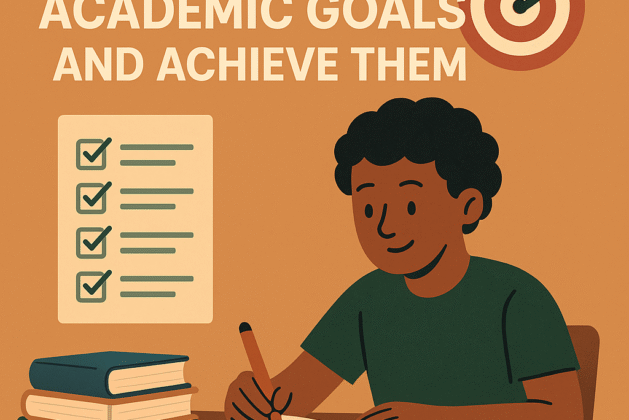Growing up, I remember my cousin Ada always seemed to do well in school. While most of us struggled to keep up with assignments or even remember when a test was coming up, Ada always had everything under control. She wasn’t the smartest in the class, but she had something many of us didn’t, clear goals and a plan to reach them.
Years later, I learned that setting academic goals, like real, practical ones, can make the biggest difference in your school life. Even if you are a student trying to improve your grades, someone preparing for an exam, or even a teacher helping students stay focused, learning how to set and achieve academic goals can change your entire journey.
How to Set Academic Goals and Achieve Them: A Simple Guide That Worked for me
Let me break it down more for you to understand what I’m saying in detail.
1. Start With the “Why”
Before setting any goal, ask yourself:
“Why do I want this?”
Do you want to get better grades so you can get a scholarship?
Do you want to pass a final exam so you can graduate?
Do you want to improve your reading skills because you struggle in class?
Knowing your “why” gives your goal power. Without it, you’ll easily give up when things get tough.
Let’s use Jide as an Example, this is not real, I”m just trying to use the character Jide to actually teach yopu somethng.
Jide, a secondary school student, was always the class clown. One day, his older brother got a job abroad because he had excellent results. That changed Jide’s mindset. His “why” became clear, he wanted to be someone his family could be proud of too. That reason helped him stay serious and focused.
2. Set SMART Goals
SMART goals are:
- Specific – What exactly do you want to achieve?
- Measurable – How will you know you’re making progress?
- Achievable – Is it realistic for you?
- Relevant – Does it truly matter to you?
- Time-bound – What’s your deadline?
Bad Goal: “I want to do better in school.”
Good Goal: “I want to improve my maths score from 60% to 80% by the end of this term.”
When goals are clear like that, you know what you’re working towards.
3. Break Big Goals Into Small Steps
Let’s say your goal is to pass WAEC with excellent grades. That’s a big dream. But how do you get there?
Break it down:
- Study two subjects per week
- Solve past questions every weekend
- Join a study group on Saturdays
- Watch YouTube videos for topics you don’t understand
Every small step brings you closer to the big win. One small brick at a time builds the whole house.
4. Use a Study Plan
A goal without a plan is just a wish.
Draw out a simple calendar. Mark important dates like test days, assignments, and exams. Then plan your study time around them.
Even one hour a day adds up over weeks. You’ll be surprised how much progress you can make with consistent effort.
Real Talk:
During my final year in university, I was overwhelmed with five huge projects. I made a simple timetable and tackled one section per day. I even gave myself rest days. In the end, I submitted everything on time and still slept well.
5. Track Your Progress
Tick off completed tasks. Celebrate small wins.
If your goal was to read 5 chapters this week and you finished 3, that’s progress! Don’t beat yourself up. Adjust the plan and keep going.
Keeping track also helps you stay honest with yourself. Are you really working, or just pretending?
6. Remove Distractions
Let’s be real—phones, friends, and Netflix can destroy your focus.
If you know you’re easily distracted, find a quiet corner. Use apps that block social media while you study. Tell your friends “I’ll call you later, I’m studying now.”
Discipline isn’t about being perfect. It’s about creating the right environment to succeed.
7. Surround Yourself With Serious People
Your circle can push you forward or pull you down.
Join study groups. Share your goals with friends who also want to succeed. Avoid those who laugh at your seriousness.
Remember: iron sharpens iron.
True Story:
When I was preparing for my final exams, my roommate was the playful type. But when I started waking up early to study, he joined me. Before long, we were encouraging each other, and we both passed with flying colors.
8. Be Ready to Fail and Try Again
You’ll miss some targets. You’ll get tired. That’s normal.
Don’t give up just because you had a bad test or a rough week. Rest if you must, but don’t quit.
Think of failure as feedback. Ask: What went wrong? What can I change?
9. Reward Yourself
Finished your notes?
Passed your test?
Kept to your study plan for two weeks?
Celebrate it. Watch a movie. Eat something nice. Take a fun break.
Rewards keep your brain motivated. It’s like telling yourself, “You’re doing great, keep it up.”
10. Pray, Meditate, or Reflect
Sometimes, you need more than hard work. Find moments to be quiet. Reflect on your journey. If you’re spiritual, pray for wisdom and strength.
Peace of mind helps you focus better.
Academic success isn’t about being a genius. It’s about having a plan, staying consistent, and believing in yourself even when it gets hard.
Ada, my cousin I told you about at the beginning? She’s now a pharmacist. She didn’t have all the answers, but she had her goals—and she chased them, step by step.
And so can you.
So, what’s your goal? Write it down now. Start small. Stay true to it. And one day, you’ll look back and smile at how far you’ve come.




Leave a comment